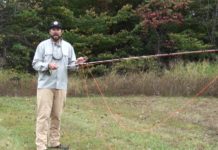Written by: CiCi Oliver, Ugly Bug Fly Shop
Photo courtesy Ugly Bug Fly Shop
As late-summer conditions create lower water levels and higher temperatures here in central Wyoming, we like to give the trout a break and focus on a less-appreciated and less-fragile quarry: the common carp. While fly-fishing for carp can be frustrating even for experienced anglers, improving your fly selection and presentation techniques can greatly increase your chances for success. In the previous chapter, we listed five favorite fly patterns, and now it’s time to talk about strategy.
1. Be Stealthy
First and foremost, move slowly and pay close attention to your surroundings, whether you’re wading or on a skiff. Carp aren’t always easy to see, despite their size, and since they often travel in schools, spooking one could end up putting all of them on alert, or even spooking the whole school away.
2. Choose Your Target
Though it may be tempting to cast at a school of carp as they migrate, it’s much more productive to focus on individual fish. Don’t waste time by taking low-percentage shots at groups, but instead look for lone carp that are actively slurping food off the surface or tailing as they eat near the bottom.

3. Lead the Fish
Once you’ve picked out a feeding fish, try to determine which direction it’s moving (however slowly) and then cast three feet in front of it and three feet beyond it, allowing you to strip the fly right in front of its face. That target zone might increase to six feet in either direction if you’re fishing in particularly shallow water or using a heavily-weighted fly. Try to avoid casting at carp that are moving away from you, since your line moving overhead or your fly moving toward the fish on the retrieve is likely to spook these wary fish.
4. Imitate Panic
When retrieving the fly, the obvious goal is to make it look as natural as possible. You want the carp to think it has scared something out of the mud, so try mimicking that frantic movement in your strips. The first few strips should be short and quick, as if the prey–usually a crayfish here in central Wyoming–is attempting to flee. Then, once you have the carp’s attention, switch to slow, smooth strips, as if the crayfish has settled and is walking again. That change of pace will usually entice the carp to strike.
Though carp are not everyone’s favorite, landing one with a fly rod is sure to change your opinion of this “trash” fish: after all, one man’s trash is another man’s treasure. Carp will test your technical abilities, your patience and, eventually, your landing-net skills as well, making them a great alternative during the dog days of summer.
CiCi Oliver works for Ugly Bug Fly Shop in Casper, Wyoming.
Credit: Source link































